We list the best CRM for real estate, to make it simple and easy for realtors to manage their customers and communications.
Succeeding in real estate is all about relationships. That’s why top agencies use the best CRM software solutions to manage them. CRM solutions can dramatically improve a customer’s experience with the business, help reduce costs, and boost sales.
Below, we’ve compiled a list of the CRM software providers we think offer the best customer relationship management for real estate businesses.
These CRMs look to help you build and maintain relationships as well as improve conversion rates, and we’ve detailed key factors to consider when choosing, as well as linking to our series of in-depth reviews.
The best CRM for real estate of 2025 in full:
Why you can trust TechRadar
We spend hours testing every product or service we review, so you can be sure you’re buying the best. Find out more about how we test.
Best CRM for real estate overall
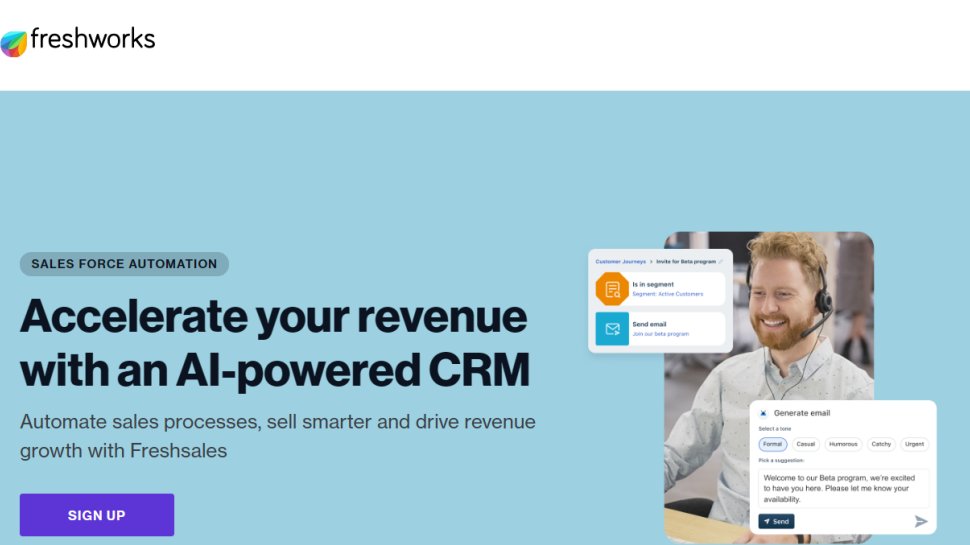
Freshsales is one of the most popular CRM solutions available today, and not just among real estate professionals. It sports an intuitive and highly customizable interface, a mobile solution with clever features like a built-in speech-to-text app, and advanced AI tools around forecasting and insights.
That customizable interface will be a boon for real estate agents in particular. You can create custom fields to store data like square footage or density, and the average cost of a neighborhood. You can also create links between modules and link contacts to a particular property, for example, or assign one or more realtors to a particular property or neighborhood.
Freshsales doesn’t offer as many integrations as some of its competitors, like Salesforce, but it has a powerful automation system as well. You can use them to create and schedule communications like newsletters, listings, or buyer contracts, create tasks and appointments, batch update fields, and send invoices.
Some lead generation tools are only available with enterprise plans, something smaller agencies should take into consideration. Still, there’s a lot to like here, and there’s a lot you can do with even basic plans.
Read our full Freshsales review.
Exclusive Freshsales deal for TechRadar Pro readers
Best free CRM for real estate
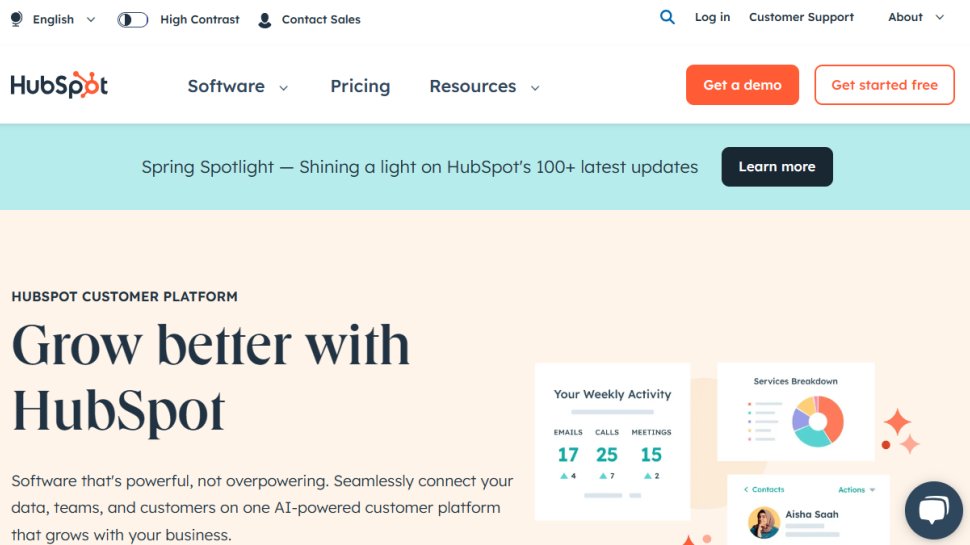
HubSpot has a modular approach to CRM that lets you pick and choose which features you want included in your package. While some of these can be pricey, the great advantage is that HubSpot’s core CRM technology is free to use. That means real estate agencies can get started with zero costs, and then simply add more advanced features as the business grows.
Another big bonus here is the HubSpot app marketplace. HubSpot integrates with over 300 different third-party applications, including Slack, Mailchimp, Gmail, and more, which means that whatever your existing workflow is, it probably already works with HubSpot.
With all the features available, the learning curve can be a bit steep. That said, HubSpot Academy provides an elegant solution. Known as an industry-leading learning center for all things CRM, HubSpot Academy contains information on how to best use and customize the app, and even offers specific certifications to bring teams up to speed—something busy realtors will appreciate.
The extra power features for marketing, support, and sales can be costly, but you needn’t pay until you’re ready, and the free version packs a real punch.
Read our full HubSpot CRM review.
Best budget CRM for real estate
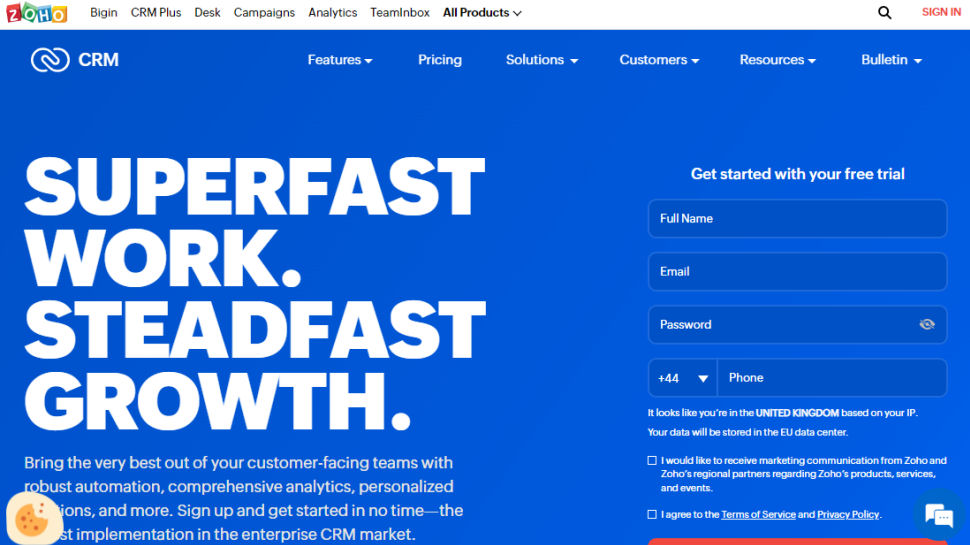
Fans of other Zoho products should look no further than Zoho CRM for a simple, straightforward CRM, which offers the best all-around, simple solution. It’s got the basics down to a T, from contact and sales pipeline management to communications, workflow automation, and reporting.
Its other big strength, of course, is the fact that it integrates seamlessly with other Zoho apps that your real-estate business can use—and may already be using—for sales and marketing, such as project management, invoicing, Zoho Mail, and even HR and payroll.
Zoho’s also got some powerful lead generation tools, including a social media scraping tool. Real estate is a visual industry, and social media campaigns can get a lot of attention. Monitor your Twitter, Facebook, LinkedIn, and Instagram posts, and scrape user data directly from the app.
The analytics and reporting tools are perhaps not as customizable as some competitors, but they’ll more than meet most realtors’ needs. Support is limited to email, but there’s some solid documentation to get you started, including a guide on building a Zoho real estate CRM.
Read our full Zoho CRM review.
Best CRM for real estate for PM
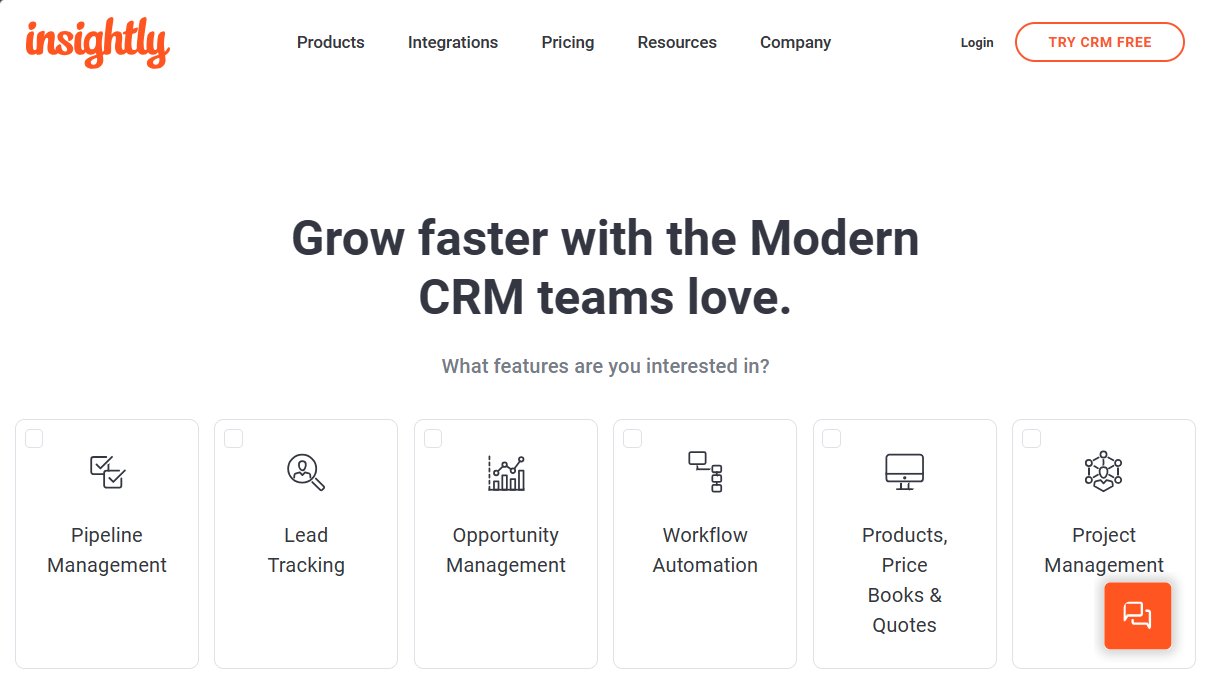
Insightly is a highly versatile platform with tons of features and a very customizable dashboard. That’s one of the reasons it can feel a bit overwhelming when first starting out, so the interface takes a bit of getting used to.
That said, there’s huge potential here in terms of advanced workflow automation and dashboard customization, although it’s not possible to hide modules you’re not using. The lead management tools and sales funnel are feature-rich and highly customizable. Like the main interface, these can feel a bit overwhelming at first. But once you’ve gotten used to the interface, it really is very powerful.
Custom fields let you add any kind of information you want to your records on customers, so realtors won’t end up feeling left behind. All of your communications, notes, and other pipeline data are automatically synced to each record, too.
Insightly benefits from good automation as well. Its “activity sets” feature (lists of tasks to be executed for each customer), for example, makes it easy to design workflows and blaze through repetitive tasks.
Read our full Insightly review.
Best specialized CRM for real estate
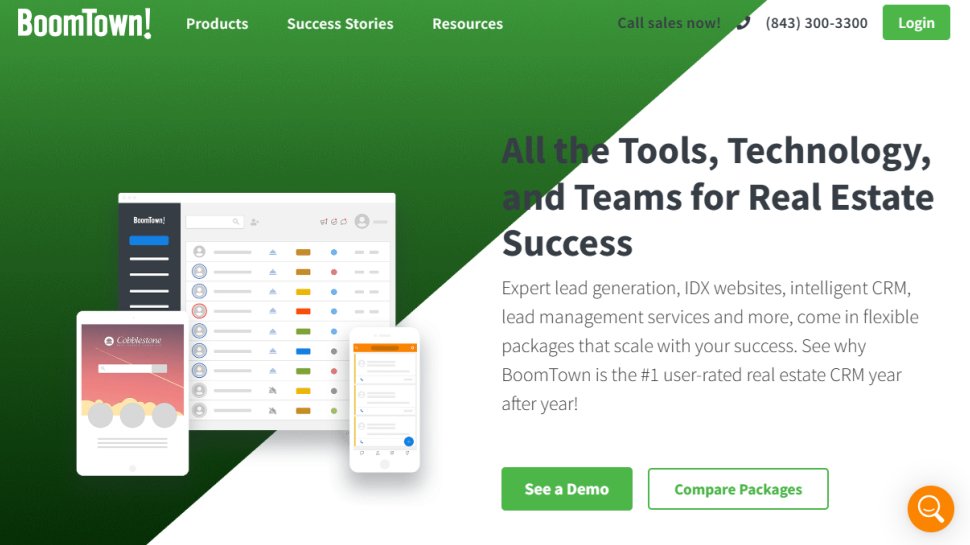
BoomTown isn’t as big or as well-known as the other heavy-hitters on this list, but it’s earned its spot because it’s been built from the ground up specifically for realtors. Thus, while it may not have the wealth of integrations or full customizability of its competitors, it does have a lot to offer for this particular industry, and is the best for real estate-focused features.
For example, BoomTown includes access to real-time property updates and listings, making it easy to stay on top of the market and send interesting properties to buyers. BoomTown also comes with its own website builder with built-in insights: you can see what properties have caught a customer’s eye or the kind of searches they’ve run.
BoomTown positions itself as a partner to your business, not just another CRM. The “Success Assurance” program, for example, will communicate with your cold leads and help convert them to transaction-ready customers or continue nurturing them for up to one year.
There are limited integrations, true, but more than a few useful automation features. For example, you can automate lead distribution to agents, get predictive insights from lead activity, and match listings to interested customers.
Best CRM for real estate for tools
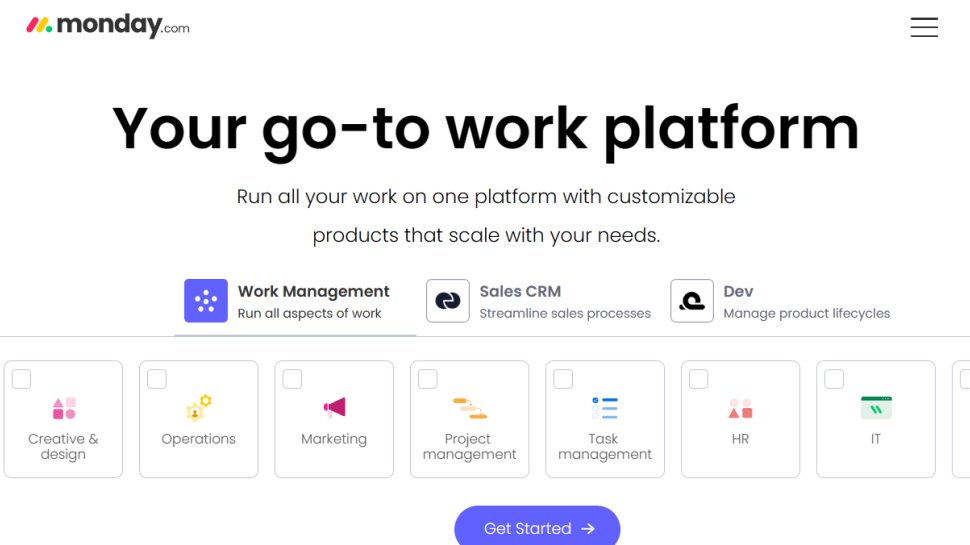
Monday.com is a project management system designed to give you a flexible and transparent way to organize your work. With a highly visual scheduling interface and customizable workflows, Monday.com adapts to the unique way members of your team approach their projects.
There are four different levels of Monday.com membership: Basic, Standard, Pro, and Enterprise. Prices vary depending on the number of user accounts you require, with the cheapest memberships only allowing you to add two users and top-end options supporting more than 200 accounts.
Monday.com is the ideal project management tool for anyone looking for an accessible system that their team will actually use. Unfortunately, some important features, like calendar views, are only available with its more expensive subscriptions. All the same, Monday.com stands out for its slick design and adaptable third-party integrations.
Read our full Monday.com review.
We’ve also featured the best productivity tools.
The best CRM for real estate comparison table
| Row 0 – Cell 0 |
Plus points |
Reasons to avoid |
Key features |
Pricing |
|
Freshsales |
Intuitive, customizable interface; mobile app with voice notes; advanced AI forecasting and insights |
Lead generation tools only with Enterprise plan; fewer third-party integrations than competitors |
Customizable fields for data like square footage; links between contacts and properties |
A free tier for up to 3 users. Paid plans start at $9 per user/month, billed annually. |
|
HubSpot |
Competitive “free-forever” plan; simple to use and understand; over 300 third-party app integrations |
Premium plans can become expensive; no telephone support with free plan; learning curve for all features |
Modular approach allows for customization for real estate; HubSpot Academy provides learning resources |
A free-forever plan with core CRM technology. Paid plans vary depending on the hub (Sales, Marketing, etc.) and tier (Starter, Professional, Enterprise). |
|
Zoho CRM |
Very easy to use; tons of integrations through Zoho Marketplace; automatic lead creation from social media mentions |
Tiered plan structure can be pricey; reporting features aren’t fully customizable; email-only customer service |
Integrates with other Zoho apps for sales and marketing; social media scraping tool for lead generation |
A free edition for up to 3 users. Paid plans (billed annually) are: Standard at $14/user/month, Professional at $23/user/month, Enterprise at $40/user/month, and Ultimate at $52/user/month. |
|
Insightly |
Integrated project management tools; user-friendly interface; 250+ app integrations available |
No live support included with plans; in-built telephony feature costs extra; interface can be overwhelming at first |
Custom fields to add information to customer records; communications and notes automatically synced to records; “activity sets” for workflow automation |
Plans (billed annually) are: Plus at $29/user/month, Professional at $49/user/month, and Enterprise at $99/user/month. |
|
BoomTown |
All features are realtor-ready and focused; extensive lead-generation features |
Limited integrations and customizations |
Built from the ground up for realtors; real-time property updates and listings; website builder with built-in insights; “Success Assurance” program for lead nurturing |
BoomTown packages have a 12-month plan with a setup fee. “Launch” is $1,000/month with a $750 setup fee. “Grow” is $1,300/month with a $1,700 setup fee. “Advance” is $1,500/month with a $1,500 setup fee. |
|
Monday.com |
Attractive interface; useful project visualization tools; supports integrations; encourages transparency and accountability |
Expensive for a large team; lacks advanced task tracking features |
Highly visual scheduling interface; customizable workflows; adaptable third-party integrations |
Plans (based on a 10-user team, billed annually) are: Basic CRM at $12/seat/month, Standard CRM at $17/seat/month, and Pro CRM at $28/seat/month. They also offer a free plan for up to 2 users. |
Honorable mentions
For real estate professional seeking the right CRM for their needs, we say look no further than the solutions listed above. However, in the course of our testing, we came across several other solutions that had a lot going for them. With that in mind, we thought we’d include a few honorable mentions below:
Follow Up Boss: With an extensive number of integrations – over 250 – Follow Up Boss provides a great way for real estate professionals to stay engaged with leads. Automation features also cut down on an agent’s manual workload and collaboration tools like lead transfers make it easy to promote team harmony.
LionDesk: Although LionDesk’s interface may not be the most intuitive, it makes up for it through its fast setup and affordability. It’s AI assistant also promises to ramp up the efficiency of your agents by streamlining workflows.
Close: With built-in email, telephone, and SMS features, Close promises to supercharge client communications. Powerful reporting capabilities also make it easy for you to capture the most important information from your customer engagements. Plus, its flexible API means that should you need additional functionality, it’s easy to connect Close with other apps.
Best CRM for real estate FAQs
What’s the best CRM for real estate?

Each of the CRM solutions on this list has something unique to bring to the table. Freshworks is our top choice for the best CRM for real estate, thanks to its cost-effective starter plan and customizable automations.
If you currently use any platforms offered by the Zoho workspace, Zoho CRM will be an excellent addition and integrates seamlessly. HubSpot’s a good option for those on a budget, with an astounding level of free functionality that’s easy to build on, including contact management with custom fields.
For larger brokerages, Insightly impresses with its extensive project management and sales support, making it easy to manage teams of realtors. Finally, BoomTown is one CRM that was built from the ground-up with realtors in mind, featuring next-level lead generation including a website and ad campaign builder.
How to choose the best CRM for real estate
As a realtor, there are a few things you’ll want to look out for when choosing the right CRM for you or your brokerage.
Lead generation can be tricky, and most of the CRMs above include at least some tools. If this is an area where you really struggle, then BoomTown, with its built-in website builder and “Success Assurance” hot-leads system, might be a good choice. For more flexibility in this area, HubSpot’s many, many integrations make it easy to build out your own lead generation system.
Customizability can also be a big success factor. Different regions and different areas of activity can call for dramatically different information needs. Insightly is one CRM that excels in this area. Automations are another important factor to consider. Most realtors prefer to spend their time out in the field, showing homes and closing deals.
The powerful automations available, for example, with Freshworks or Zoho can help you spend less time pushing buttons and more time shaking hands.
How secure is my data within the CRM?
Although data privacy and security are increasingly important for all industries, this is especially true of the real estate space due to the sensitive nature of my of the information being shared. Transactions can involve hundreds of thousands or even millions of dollars and a range of personally identifiable information will change hands.
Fortunately, many CRM solutions take security extremely seriously, well aware of ho important it is to businesses in the real estate sector. As such, encryption, backup procedures, compliance with relevant regulations (like GDPR if applicable in the UK), and access controls, are all regularly employed.
What kind of support and training is available?
Users will want to know what resources are at their disposal if they encounter issues or need assistance. Although the types of support offered will vary by solution, many CRMs offer a range of options, including livechat, phone, and email, as well as forums for peer support. Of course, opening hours for support may depend on the payment plan and the chosen channel. Dedicated onboarding processes may be provided to ensure successful adoption, but those based in the real estate sector may find it challenging to find bespoke industry support if their chosen CRM is more of a generalist one.
How can I streamline my real estate business with a CRM?
Although CRMs can enhance productivity in the real estate sector in any number of ways, automation is really the key. My CRMs come with automation features (especially with higher payment plans), which can be used to eliminate manual work around marketing, the sales process, and the administrative follow-up.
Real estate involves numerous deadlines, appointments, and follow-up activities. A CRM’s automation features can automatically create tasks for agents based on specific triggers – for example, scheduling a follow-up call two days after a property showing, reminding an agent about a contract signing deadline, or prompting them to send a birthday message to a past client. It means opportunities won’t be missed.
How we tested the best CRM for real estate
We look at a variety of factors when testing CRM software. This includes features, such as contact and lead management, deal management, bulk emails, and lead generation. We also look at third-party integrations and automations that can extend a CRM’s utility.
Usability is very important, as for most people CRM software is a means to an end, not something to spend a lifetime mastering. We look at the interface, helpful or useful shortcuts, and customizability.
Customer service is another important element. We review the standard support options, like phone, email, and chat, but also what kind of supporting documentation is available, and how responsive and friendly the customer service is. Of course, cost comes into play, but also the number of plans to fit different budgets—and whether a free trial is available.
Read how we test, rate, and review products on TechRadar.
Get in touch
- You’ve reached the end of the page. Jump back up to the top ^

